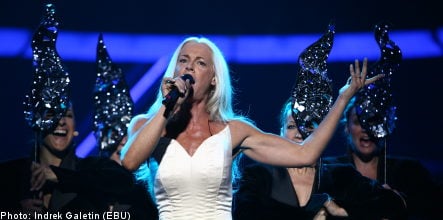If recent figures are anything to go by, almost a third of Swedes will be glued to their televisions today to watch Malena Ernman, a 38-year-old classically-trained opera singer, attempt to add another Eurovision notch to Sweden’s bedpost.
Carolina Noren, a radio disc jockey on the P4 music channel who has been commentating on Eurovision for 10 years, said the 1974 victory by Sweden’s most famous musical export turned the event into a national obsession.
“When ABBA won it became so big and we’ve had a lot of success since then,” Noren explains.
“In Sweden, it is really serious. During the time of the national contest when our entry is chosen, few artists release any records during this period because (Eurovision) is the only thing that people are interested in,” she added.
Not all participants share Sweden’s burning passion for Eurovision. In 2008, only 10 percent of Britons, five percent of French and seven percent of Germans tuned in to watch, according to data from the three countries’ public broadcasters.
Eurovision’s popularity, like many other things in Sweden, might be blamed on the weather. Ernman, a graduate of the Swedish Royal Academy of Music, told AFP her country’s national contest, which runs for six weeks from February to March, provides welcome relief for music fans from the dark, long winter nights.
“We all need something to do during those five to six months with all this greyness and winter so I suppose this is why it is so big. People are looking forward to it,” she said.
But Martin Ekelund, an entertainment news reporter for Aftonbladet newspaper, said Ernman’s offering “La Voix” faces an uphill battle to take first place on Saturday night in Moscow.
“It’s going to be very tough for Malena to win,” he told AFP. “Sweden isn’t a big nation in the competition as it used to be.”
Ekelund thought Sweden’s Norwegian neighbours might take home the prize, and expected many Swedes to vote for them.
“We usually vote for each other. I suppose it is because we have the same tradition of music and you like the music that is close to your own traditions. It’s not a political thing, it’s a cultural thing,” he said.


 Please whitelist us to continue reading.
Please whitelist us to continue reading.
Member comments